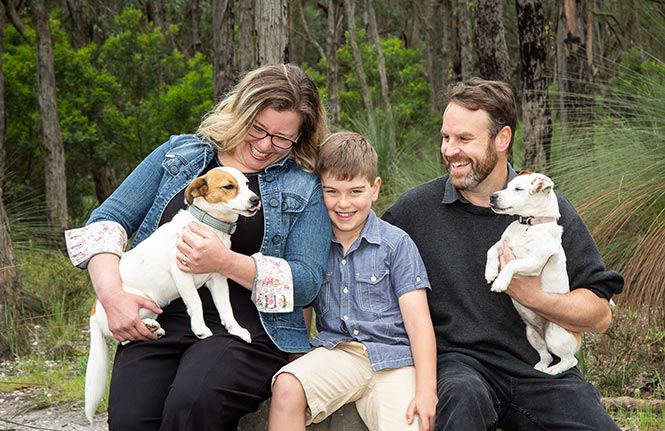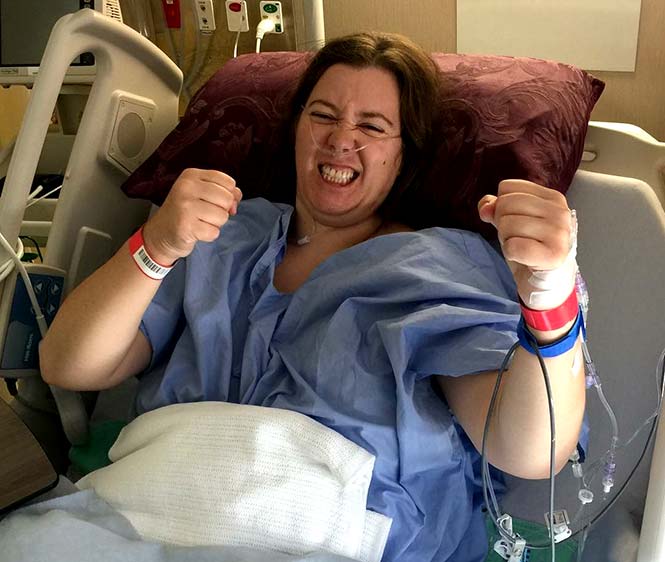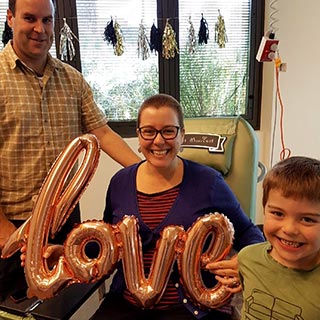AFTER being diagnosed with young onset colorectal cancer (YOCRC) three years ago, Emma Barrance-Kelly is helping improve cancer outcomes for others.
Emma is currently living with an advanced stage of the disease and undergoing palliative treatment.
“Since my initial diagnosis (of recto sigmoid colon cancer) in January 2018, I have had to significantly redesign my role in the world,” she said.
“I am a proud mother and wife, and after a premature medical retirement from my working life, have shifted my attention to further raising awareness of YOCRC. Don’t let being ‘too young’ stop you exploring abnormalities with your doctor.”

Emma with her son Gus, husband Ben and their two dogs.
Emma was approached by the University of Melbourne’s Buchanan Lab in late 2018 to take part in a revolutionary study aiming to find the genetic link of familial bowel cancers.
“I want to contribute what I can, while I can, to help raise awareness of this disease in young people,” she said.
“I was diagnosed too late; I am terminal and currently deescalating my palliative treatment to focus on quality of life rather than quantity. Had there been an easier screening pathway I would have potentially not been facing end of life at 41.”
The project will use a mathematical algorithm to identify which bowel tumours have a familial link. The team will then study these tumours for a genetic profile which can identify the cause of the tumour – whether it’s inherited, environmental or bacterial.
The study is one of 13 new research projects that will share in $3.8 million from Cancer Council Victoria as part of our Grants-in-Aid program, which funds high-quality research projects into the treatment, causes, detection and prevention of all cancers. Also announced as part of the program are two new postdoctoral fellowships to support promising researchers of the future.
Emma raises awareness
Emma’s cancer diagnosis came after experiencing years of constant bleeding and bowel discomfort.
“I put the bleeding down to haemorrhoids that my pregnancy body gifted me years before. My GP suggested a colonoscopy after some unexplained abdominal pain saw me hospitalised and I was discharged with a ‘suspected’ kidney stone,” she said.

Emma had no idea she would be a candidate for cancer.
“It felt surreal hearing the words ‘there is a tumour in your colon’; I felt confused. My husband (Ben), son (Gus) and I were suddenly launched into the cancer world where it was all about looking after me - something I personally had been quite bad at,” she said.
“The local integrated cancer centre, Ballarat Regional Integrated Cancer Centre, embraced me and my small family.”
She later became involved with University of Melbourne’s Buchanan Lab and its research into the identification and investigation of colorectal cancer.
“They are an amazing team of doctors and scientists working tirelessly to find better ways of screening young people for cancer in Australia,” she said.
“I’ve been enjoying deep diving into some of the behind the scenes work that must happen to save lives. I never knew science was so cool, so pivotal at making positive change within our health system, and so open to engaging with young ‘consumers’ like me.
“Without a ‘cure’, I think research into cancer can be perceived as work that happens exclusively in a lab and doesn’t have much impact. I have been lucky enough to see first-hand the efforts gone in to the design of studies that will improve the screening and detection of cancer in the future.”
Emma hopes her participation in the study will help people with possible genetic links to bowel cancer.
“In the absence of a known inherited cause, I do not know if any of my relatives are at risk of developing c olorectal cancer. In particular, I worry about my son’s risk. This study will provide opportunities to develop better diagnostic and screening tools - tools I hope will one day benefit my son, among others,” she said.

Project aims to improve outcomes
University of Melbourne research team chief investigator Professor Ingrid Winship said the study’s aim was to reduce the burden of bowel cancer disease, both in terms of lives lost and quality of life lost.
“Bowel cancer is one of the leading causes of cancer-related deaths in Australia, yet it is one of the most preventable cancers,” she said.
“If we can identify who is at risk of developing bowel cancer and target them for screening, we can prevent many cancers and save lives, especially in young people.
“Doctors talk a lot these days about ‘targeted therapies’ to treat cancers; what we are trying to achieve here is targeted screening and precision prevention.”
Professor Winship said up to 35 per cent of bowel cancers were thought to be caused by genetic risk factors, but only five to 10 per cent of cases could be identified as such.
“There is currently a significant problem for patients and families, as well as clinicians, who are unable to receive an explanation for the cause of bowel cancer in their family. We hope to close the gap between explained and unexplained cases,” she said.
“We are passionate about community consultation in our research, right from the beginning of our projects. We have three consumer investigators leading the project - Emma, along with Natalie Diepenhorst and Julie Toner - who inform our research and help us translate it to the real world.
“In speaking to Emma about what was important to her as a young onset bowel cancer patient, she was concerned about whether her son was at risk of developing the disease too, informing the focus of our study.”
About Grants-in-Aid
Cancer Council Victoria’s Grants-in-Aid program funds high-quality research projects into the treatment, causes, detection and prevention of all cancers.
Over the past decade more than $57 million in grants has been awarded to external researchers in Victoria.
Cancer Council Victoria chief executive officer Todd Harper said these projects had led to many tangible breakthroughs.
“The new projects announced are varied in their goals, however they all have the potential to significantly impact how we detect and treat different forms of cancer,” he said.
“Leading scientists from Victoria’s cancer and medical research bodies helped to identify these high-quality research projects, which are entirely funded by Cancer Council donors and highlight just how important they are in helping us work towards the next cancer breakthrough.
“As the largest non-government funder of cancer research in Victoria, we have been awarding fellowships and grants to the very best and brightest cancer researchers for more than 60 years and we are proud to be awarding 13 more grants to similarly highly-regarded researchers today.”
Grants-in-Aid projects
Cancer Council Victoria’s Grants-in-Aid program funds high-quality research projects into the treatment, causes, detection and prevention of all cancers. 13 research projects will share in $3.8 million to begin work in 2021.
Successful 2021 Grants-in-Aid projects